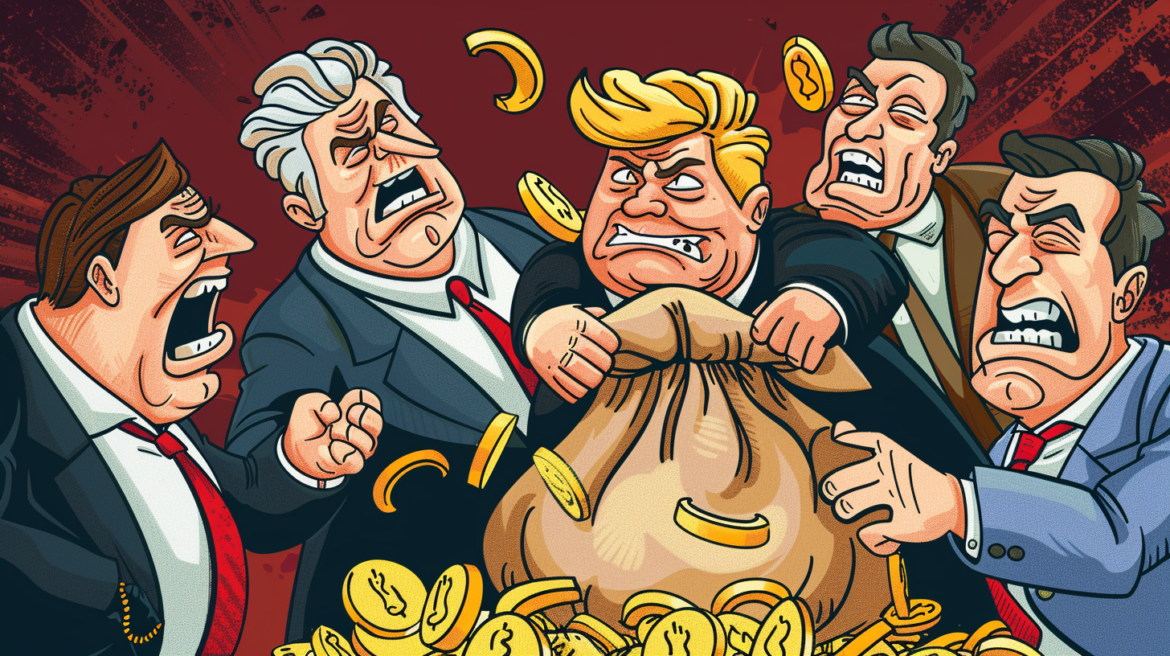Gold has all the potential to go unprecedentedly high. But silver will be gold on
Site:
Precious metals news
In a bold move to revive their economy, Zimbabwe has announced plans to launch a gold-backed currency. Will they succeed?
This week saw a significant increase in mortgage rates, pushing past the 7% threshold and dampening the enthusiasm of potential homebuyers. The rise in rates comes amid persistent high inflation, challenging the previously held optimism for a Federal Reserve rate cut in time for the spring buying season. Specifically, the average rate for a 30-year fixed mortgage climbed from 6.97% to a peak of 7.13% on February 13, as per Mortgage News Daily, before settling at 7.03%. This upward trend in mortgage rates is making entering the housing market harder than ever.
Boston is facing a significant challenge as the city anticipates a tax revenue shortfall exceeding $1 billion in the next five years due to the depreciating office real estate market. This forecast stems from a collaborative analysis by Tufts University’s Center for State Policy Analysis and the Boston Policy Institute, drawing on a McKinsey & Co. projection of a potential 30% reduction in office property values by the decade's end. The city's heavy reliance on commercial property taxes exacerbates the situation.
The silver price has dipped since December, from almost $26 per ounce to around $22 today. We reported on silver being a relative bargain at the time, and with lower spot prices and an even higher gold/silver ratio today, gold’s monetary sibling is looking like an even more attractive buy than it was late last year.
The cryptocurrency market has seen a significant resurgence, with its total value surging back above the $2 trillion mark. This rally was led by Bitcoin, which is currently trading around $52,000, and Ether, which has recovered to its value prior to the TerraUSD stablecoin collapse nearly two years ago. Bitcoin's impressive year-to-date gain of almost 25% has been a major factor in elevating the digital asset market's capitalization to this milestone level for the first time since April 2022, according to data from CoinGecko.
Feb 15, 2024 - 08:51:40 PST
the Central Bank of Ireland notably doubled its gold reserves in 2022, expanding its holdings from six to twelve metric tonnes. This strategic decision, articulated by then Finance Minister Pascal Donohoe, was aimed at diversifying the bank's long-term investment approach to enhance the resilience of its balance sheet. This move underscores the role of gold as a key component in safeguarding financial stability amidst the volatility of modern investment avenues.
Stanley Druckenmiller's Duquesne Family Office has made significant adjustments to its portfolio, as revealed in a recent SEC filing. Druckenmiller's firm divested its holdings in tech giants Alphabet Inc., Amazon.com, and Broadcom Inc., while making a notable pivot towards the precious metals sector, Duquesne has invested in gold mining companies Barrick Gold Corp. and Newmont Corp., which have been undervalued in recent times.
 Consumer Confidence Dips: Retail Sales See Unexpected Decline in January
Consumer Confidence Dips: Retail Sales See Unexpected Decline in JanuaryFeb 15, 2024 - 06:45:45 PST
In January, retail sales experienced a significant decline of 0.8%, indicating a potential warning signal for the economy. This drop, reported by the Commerce Department, surpassed the modest 0.3% decrease economists had predicted, reflecting a more substantial consumer pullback than anticipated. Despite seasonal adjustments, the decrease was even evident when excluding auto sales, which fell by 0.6% against an expected increase. This trend suggests consumer spending is not keeping pace with inflation, as evidenced by the year-over-year sales growth of merely 0.6%. Such a sharp reduction in consumer spending could have implications for economic health, particularly if this trend continues.
During this week's Super Bowl ads, Biden slammed greedy corporations for inflation. In his most recent podcast, Peter explains exactly what’s happening with inflation, and why Biden’s blame game has it backward.
With the Gold price finally surpassing $2,000, what will it take to get it over $3,000? That all depends upon important Gold Market fundamentals that I discuss in detail in this Video Report. Although, we will probably haven't seen the lows yet in the gold price, especially during a significant market correction...
Federal Reserve Vice Chair for Supervision Michael Barr commented on the economic challenges ahead, noting the U.S.'s path back to 2% inflation "may be a bumpy one." Despite a year-on-year consumer price increase of 3.1% and a core inflation rate holding steady at 3.9%, largely propelled by rising shelter costs, Barr expressed a cautious optimism. He reaffirmed the Fed's commitment to steering the economy back to a 2% inflation target. However, he emphasized that the journey towards this goal is anticipated to be fraught with obstacles, as underscored by the latest data.
 Japan Sounds the Alarm on Yen's Speculative Tumble Amidst Rising U.S. Inflation
Japan Sounds the Alarm on Yen's Speculative Tumble Amidst Rising U.S. InflationFeb 14, 2024 - 13:31:31 PST
Japan's financial leaders have raised concerns over the swift and speculative decline of the yen, which recently crossed the 150 mark against the dollar, posing risks to its trade-dependent economy. This warning came as the dollar reached a three-month high against the yen following U.S. inflation data for January, which exceeded expectations and bolstered the belief that the Federal Reserve might maintain current interest rate levels into March. This situation highlights the delicate balance between national economic interests and global currency markets, particularly how external factors like U.S. monetary policy can influence the value of currencies like the yen and affect economies reliant on international trade.
CNBC shows the inflation breakdown for January 2024 in one chart. The CPI rose by 3.1% in January and workers’ buying power has increased each month since May. However, there were a few potentially worrying signs under the surface.
 Fed's Rate Cut Hesitation: Inflation Concerns and Economic Uncertainties Dominate
Fed's Rate Cut Hesitation: Inflation Concerns and Economic Uncertainties DominateFeb 14, 2024 - 09:18:22 PST
As the Federal Reserve kicked off 2024 nearly achieving its inflation target, officials remain hesitant to lower interest rates due to the persistent risk of inflation exceeding their 2% goal. Recent inflation data, particularly concerning consumer prices excluding food and energy, rose unexpectedly in January, suggesting businesses, especially within the services sector, still possess significant pricing power. This development has dampened hopes for an imminent easing of monetary policy. The Fed's cautious stance is further reinforced by various uncertainties, including the robustness of the economy and geopolitical tensions, which have influenced their decision to adopt a more deliberate approach towards adjusting interest rate policies.
Gold miner SSR Mining suspended production at a mine in eastern Turkey after a landslide, which left at least nine miners missing. The disaster also sent the stock down more than 50% in its Toronto-listed shares.
On Monday Zimbabwe’s government said it plans to introduce a gold-backed currency to replace the country’s nearly worthless dollar. Minister for Finance and Economic Development Mthuli Ncube told reporters in an online press conference that Zimbabwe was making the move to ensure sustained growth. “Going forward, we want to make sure that the growth we have achieved so far — which is very strong — is maintained and even increased,” he said. “We can only do that if we have further stability in the domestic currency. ... And the way to do that is perhaps to link the exchange rate to some hard asset such as gold.”
When members of Congress aren’t passing laws, holding committee meetings, or more cynically fundraising endless dollars, some of them choose to pass the time by trading stocks. And for whatever reason, keen insight or perhaps insider trading, members of Congress tend to beat the market.
 THE WORST BEARISH NATGAS PRICE TREND IN FIVE YEARS: Natgas Price Continues To Plunge To 25-Year Low
THE WORST BEARISH NATGAS PRICE TREND IN FIVE YEARS: Natgas Price Continues To Plunge To 25-Year LowFebruary 14, 2024
The situation couldn't be worse for the U.S. Shale Gas Industry as the natgas price Plunges to a 25-year low. With Europe and the U.S. Natgas Inventories hitting the highest levels in the past five years, this has caused the natural gas price to fall to $1.61 today...
Scotiabank has forecasted a downturn for the US Dollar in 2024, influenced by the strengthening of the BRICS alliance and ongoing global inflation trends. Over the past year, the BRICS countries have seen an increase in their economic significance, partly due to Western sanctions which have accelerated their de-dollarization efforts. These developments are expected to further diminish the value of the US Dollar, particularly in its exchange rates against other major global currencies. Scotiabank's analysis suggests that the concerted efforts of the BRICS nations to reduce dependency on the US Dollar, combined with inflationary pressures, will contribute to the dollar's depreciation in the upcoming year.
 Biden Has Forgiven $136 Billion in Student Debt – More Could Be on the Way
Biden Has Forgiven $136 Billion in Student Debt – More Could Be on the WayFeb 13, 2024 - 12:46:13 PST
During President Joe Biden's tenure, over 3.7 million borrowers have seen their student loans forgiven, totaling $136.6 billion in relief. The Supreme Court thwarted Biden's proposal to cancel up to $400 billion for millions of Americans, prompting his administration to leverage every available avenue within its existing authority to reduce student debt burdens. The administration's proactive review of borrower accounts continues to identify those eligible for forgiveness, marking a period of unprecedented loan cancellation activity.







